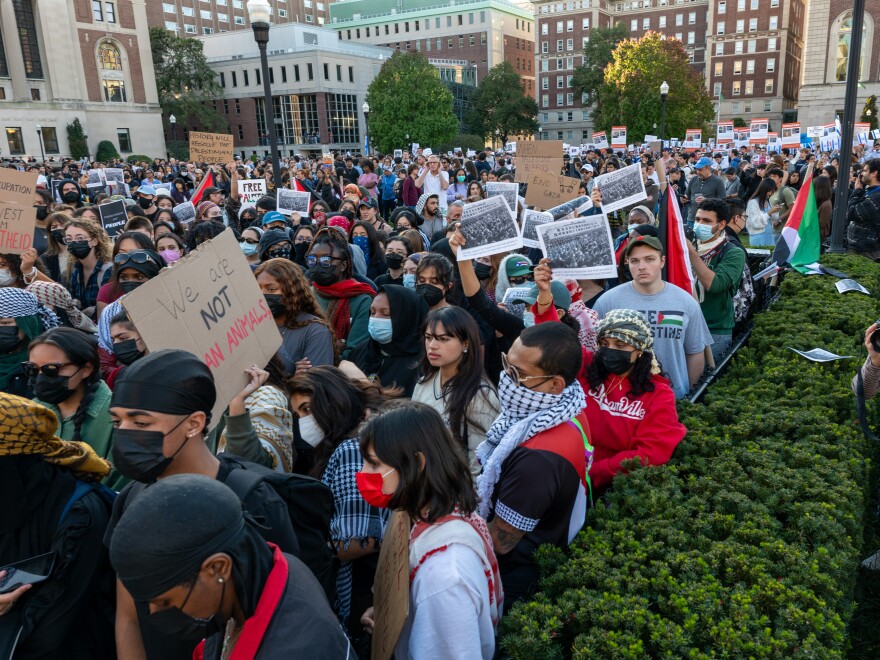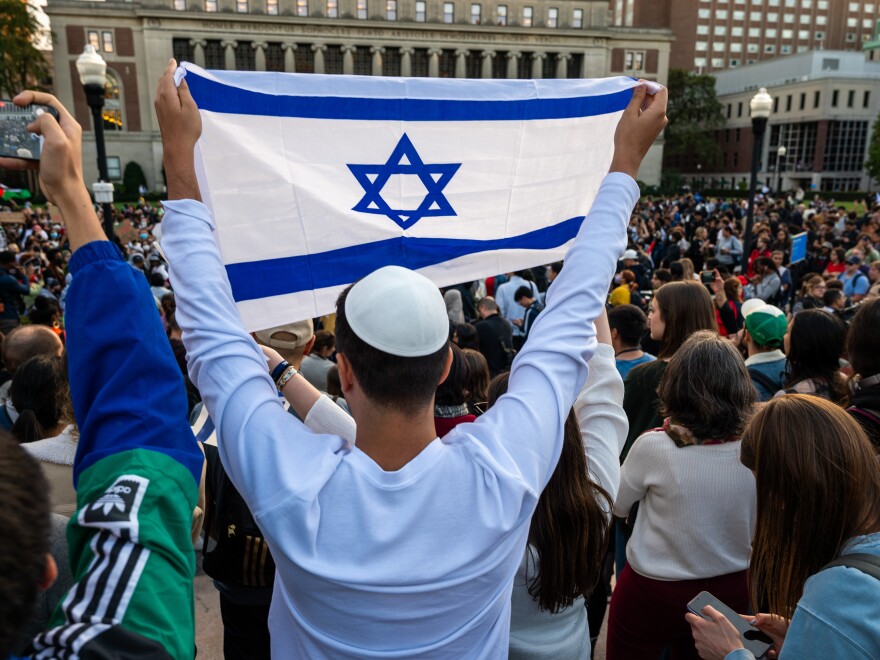The violence in Israel and Gaza has heightened tensions on college campuses across the U.S., as students, staff, and administrators grapple with how to respond.
Pro-Israel and pro-Palestinian student groups are weighing in online and in person, with many of their statements and protests provoking strong reactions from the other side.
Take the controversy at Harvard, where dozens of student groups signed onto a letter from the Harvard Palestine Solidarity Committee (PSC) on Oct. 7 — the day Hamas launched its surprise attack on Israel — holding Israel "entirely responsible for all unfolding violence."
The letter garnered widespread backlash from students, faculty, high-profile alumni, politicians, and even Harvard's president. Several groups have since retracted their support of the letter, though some of their members have been doxxed.
In New York, the president of NYU's Student Bar Association wrote that "Israel bears full responsibility for this tremendous loss of life," in a letter to the group that quickly went viral and drew widespread condemnation. The student has since lost their law firm job offer and is in the process of being removed from their leadership role.
Student groups have also held vigils and protests, which in some cases have led to direct confrontations between pro-Israel and pro-Palestinian groups.
Protesters clashed at schools, including the University of North Carolina at Chapel Hill and Indiana University, in recent days. Columbia University closed its campus to the public on Thursday due to safety concerns over two planned student protests, a day after an Israeli student was allegedly assaulted with a stick outside its library.
Some university administrations have been more vocal than others, with their comments — or lack thereof — further stirring up emotions.
Some, like University of Florida President Ben Sasse, have issued statements strongly supporting Israel and Jewish students. Others, like Vanderbilt University and Ohio State University, have been more neutral.
And certain schools haven't weighed in at all — Stanford University's statement stressed its policy of neutrality, while Northwestern University's president announced he won't be releasing an official statement on the school's position on this or other geopolitical issues going forward.
How exactly should colleges be responding to this current moment, both to support students' rights and protect their safety? It's a complicated question, experts tell NPR.
Eboo Patel, the founder and president of Interfaith America — an organization that works with nearly 1,000 campuses on interfaith issues — described a phone call he got from a college president who was worried that a peaceful vigil could turn violent.
His response was that colleges need to be two things right now: communities of care and cooperation. People are hurting, he adds, and words matter.
"We're not going to minimize the conflict, we're simply going to say that we are not going to allow the conflict to prevent us from cooperating on other things," Patel says. "That's the genius of American college campuses. That's what college presidents and athletic directors and faculty and staff and students need to keep their focus on right now."
The conflict gives new urgency to a long-divisive topic

The Israeli-Palestinian conflict was already a divisive topic on college campuses, as in U.S. society at large.
An NPR/PBS NewsHour/Marist poll finds that, while two-thirds of Americans say the United States should publicly support Israel in the war between Israel and Hamas, there are wide generational and racial differences.
Students have been on the cutting edge of social justice movements throughout history, from protesting the Vietnam War to fighting for immigrants' rights, says Radhika Sainath, a staff attorney at U.S.-based advocacy group Palestine Legal.
She says pro-Palestinian advocacy on college campuses is not new, nor is the backlash against students who speak out. But she says her group has seen an "exponential surge" in requests for legal help — as many as 10-20 a day — from people who have been fired from their jobs, questioned or threatened for expressing support for Palestinian rights.
Sainath stressed that the First Amendment right to free speech is protected at public universities and most private schools, depending on the state. But sometimes, she says, universities violate their own policies.
"People are just really, really scared right now at universities and across the country, especially students and professors are really worried about what they are able to say," she said.
Jewish students say they're scared, too, with antisemitism on the rise in much of the country. A September Ipsos poll found that 57% percent of Jewish college students report having witnessed or experienced an antisemitic incident, either on their campus or in the general public.
Caroline Yaffa, a senior at UNC-Chapel Hill, says she feels unsafe because of several recent incidents on campus. She says her parents are worried about her safety going to classes, and the thought of showing her ID — with her Jewish last name — at a bar makes her anxious now.
"It's so upsetting because I love my heritage, I love my religion, I love going to synagogue, I love celebrating the holidays with my family when we all get together, and I'm not ashamed of it," she said. "But I also want to protect my safety."
Students want to feel heard and supported
Yaffa believes universities are obligated to weigh in on events like the Israel-Hamas conflict because they represent "every single person in their community" and should protect all of its members. She said she would have felt safer on campus if UNC leadership had done more beyond talking with students and posting a statement on social media.
Hours after she spoke with NPR on Friday, UNC Chancellor Kevin Guskiewicz sent a campus message condemning Hamas' actions in Israel and promoting resources for all affected students and staff, for which Yaffa said she was "beyond grateful."
"I think it's never too late to support these innocent people," she said. "I think it's never too late to support the Jewish community."
Students for Justice in Palestine sees universities' role differently. The student activist group (which the Anti-Defamation League has roundly criticized) has chapters at hundreds of U.S. campuses and has been behind many of the recent protests. The organization's steering committee — a mix of both current students and recent graduates — told NPR over email that they don't believe universities always need to take a public stance on global events.
But they say universities do have an obligation to defend students' rights to speak and protest, and protect them from smear campaigns and doxxing. They said public university statements have maligned pro-Palestinian protests as support for violence, "even while vocally affirming their right to free speech."
"Universities have intentionally abandoned Palestinian, Arab, and anti-Zionist students in this political moment, giving tacit support to the dangerous backlash they face," they added.
Sainath, the Palestine Legal attorney, says she has seen a pattern of schools putting out statements that only mention the pain and loss of Israeli and Jewish students, "basically erasing Palestinian pain."
Students from all backgrounds and viewpoints are hurting, and the first priority of any college should be to respond to that human suffering, says Patel, of Interfaith America.
"That is not both sides-ism," he says. "That is: There is a human being in front of me whose family is in danger and that person is hurting and I am going to show that person care."
What if colleges stopped weighing in altogether?

Alex Morey, the director of campus rights advocacy at civil liberties nonprofit FIRE, said universities are under pressure — and competing demands — to weigh in on current events.
She says institutions were in a similar position in 2020, with the confluence of racial justice protests, a raging pandemic and a high-stakes presidential election. Since then, it's been common for schools to release statements about all sorts of issues.
"But then they get to things like the war in the Middle East, where there's really no correct answer, yet they have put themselves in a situation where not saying anything is unusual for them," Morey adds. "And so when they don't say anything, what does that mean?"
She says universities are now in a "no-win position" because of this trend. But she sees a way out — and it's following the footsteps of places like Stanford and Northwestern, and removing themselves from the debate.
Morey would like more of them to say: "We are a university that plays host to these debates of issues that are of incredible importance. We are not going to put our thumb on the scale as the university one way or another because that will chill the environment for free expression, for scholarly inquiry."
She says those institutions will get pushback in the immediate term, but will make their lives much easier in the medium- and long-term.
She says there are other ways university leaders can support students when difficult things are going on in the world, like offering condolences and counseling services.
"The best thing they can do when these divisive issues come up is do their university thing," she adds. "That's what they do best: Host these debates, have students come together in a way that is constructive and in a way that students feel like they have a place to be heard and that the debate can go on in a scholarly, civil way."
Copyright 2023 NPR. To see more, visit https://www.npr.org.



